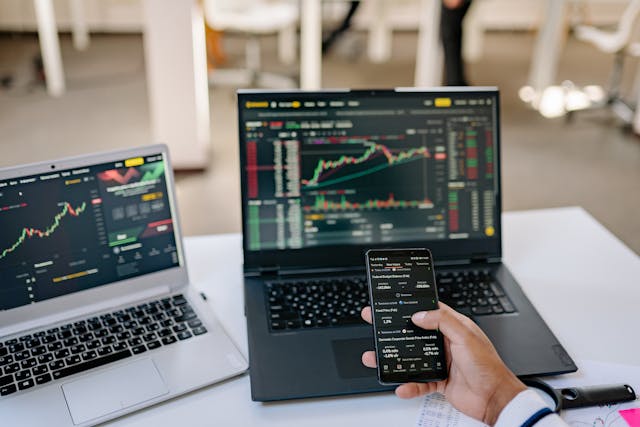When it comes to Forex trading, having the right tools in your arsenal is crucial. Whether you’re just starting out or already familiar with the markets, understanding trading pairs, choosing the right broker, and mastering essential software are key steps to achieving success.
Let’s break it down and explore how to navigate these essentials with confidence.
Trading Pairs: Major, Minor, and Exotic Pairs
In Forex, you’ll be dealing with currency pairs—essentially, you’re buying one currency while selling another. But not all pairs are created equal, and understanding which ones to trade can make a big difference in your performance.
1. Major Currency Pairs
These are the most traded pairs in the world, and they all include the U.S. Dollar (USD) on one side. Majors are popular because they have high liquidity and lower spreads, making them ideal for most traders.
- Examples: EUR/USD, GBP/USD, USD/JPY, USD/CHF
- Why Trade Them? Majors tend to have lower volatility and are influenced by key global economic factors. They’re great for traders who prefer more predictable price movements.
2. Minor Currency Pairs
These pairs don’t include the USD, but they’re still widely traded and liquid. Minors often have higher volatility compared to majors, which can lead to greater opportunities for those who can manage risk effectively.
- Examples: EUR/GBP, AUD/NZD, EUR/AUD
- Why Trade Them? Minor pairs can provide unique opportunities as they react to regional events and economic conditions outside of the U.S. market.
3. Exotic Currency Pairs
Exotics are combinations of a major currency with the currency of an emerging or smaller economy. These pairs can have wider spreads and lower liquidity, but they also offer higher risk-reward potential.
- Examples: USD/TRY, GBP/ZAR, EUR/MXN
- Why Trade Them? If you’re an experienced trader looking for bigger price movements and don’t mind higher volatility, exotic pairs can provide interesting opportunities.
4. Commodities
Commodities are physical assets like gold, oil, and agricultural products that traders buy and sell. Their prices are driven by supply-demand dynamics, geopolitical events, and economic indicators.
Examples: Gold (XAU/USD), Oil (WTI), Silver (XAG/USD)
Why Trade Them? Commodities provide diversification and can act as a hedge against inflation. They tend to have strong reactions to global events, offering opportunities for significant price movements.
5. Indices
Indices represent the performance of a group of stocks, offering a broader view of market sentiment. They are less volatile than individual stocks but can still provide substantial movement during economic shifts.
Examples: S&P 500, NASDAQ, FTSE 100
Why Trade Them? Trading indices allows you to speculate on the overall market performance rather than individual stocks, offering a balanced approach to trading.
6. Cryptos
Cryptocurrencies are digital assets that operate on blockchain technology. They are known for their high volatility and are influenced by market sentiment, technological advancements, and regulatory news.
Examples: Bitcoin (BTC/USD), Ethereum (ETH/USD), Ripple (XRP/USD)
Why Trade Them? Cryptos offer extreme price swings, ideal for traders seeking higher risk-reward scenarios. They’re also a growing asset class with increasing global adoption.
Choosing the Right Trading Pairs
When choosing pairs to trade, market conditions and your personal strategy should guide you. Are you looking for stable trends, or do you thrive in high-volatility environments? Consider the economic calendar, geopolitical events, and central bank policies for the currencies you’re trading.
For example, if the U.S. Federal Reserve is making a major policy announcement, you might want to focus on USD pairs. Or, if there’s a trade agreement news between the U.K. and Europe, GBP/EUR could be your go-to pair.
Brokers: How to Choose Wisely
Not all brokers are created equal, and selecting the right one can mean the difference between a smooth trading experience and constant headaches. Here are key criteria to consider when choosing a broker.
1. Regulation
Always ensure that your broker is properly regulated by a respected financial authority. This protects you from fraudulent practices and ensures your funds are kept in safe, segregated accounts. Look for brokers regulated by authorities like the FCA (UK), CySEC (Cyprus), or CFTC (USA).
2. Trading Fees and Spreads
Some brokers charge commissions on trades, while others make money through spreads—the difference between the buy and sell price. Make sure you choose a broker with low, competitive fees that won’t eat into your profits, especially if you plan on making multiple trades daily.
3. Execution Speed
In Forex trading, every second counts. Choose a broker that offers fast trade execution to avoid slippage, where your order is executed at a different price than expected due to market volatility.
4. Leverage
Leverage allows you to control a large position with a smaller capital. While it can amplify your profits, it also increases your risk. Look for a broker that offers flexible leverage options so you can manage your risk effectively.
5. Customer Support
You want a broker that’s reliable when it matters most. Check for 24/7 customer support and read reviews to make sure they respond quickly to inquiries and resolve issues efficiently.
Here is a list of 9jacashflow Recommended Forex Brokers
We suggest you don’t put all your money in a single one in case of unforeseen circumstances. Spread your trading capital among these 4 brokers.
Software: Trading Platforms and Analytical Tools
To trade like a professional, you need access to powerful software that provides real-time market data, charting tools, and trade execution features. Here’s a look at some of the most essential platforms and tools you’ll be using:
1. MetaTrader 5 (MT5)
MT5 is the industry standard for Forex trading platforms. It offers advanced charting, algorithmic trading (through Expert Advisors or EAs), and multi-currency support. The platform is user-friendly, yet packed with features that even seasoned traders can appreciate.
- Why Use It? MT5 is robust and flexible, supporting everything from technical analysis to automated trading. It’s widely supported by brokers and comes with a range of built-in indicators.
2. TradingView
Known for its clean, modern interface, TradingView is a popular web-based platform that allows you to perform in-depth technical analysis. It also supports social features, so you can share ideas with other traders.
- Why Use It? TradingView is perfect for traders who want powerful charting tools without needing to download software. It’s great for both beginner and advanced traders.
3. Expert Advisors (EAs)
EAs are automated trading systems that you can run on platforms like MT5. They allow you to automate your trading strategy, removing emotions from the equation and executing trades based on predefined criteria.
- Why Use Them? If you have a reliable strategy, EAs can free you from constantly monitoring the market, helping you execute trades efficiently and consistently.
4. Myfxbook.com
This is a platform where traders can track, analyze, and share their trading performance. It’s especially useful for evaluating strategies, as you can monitor your trades in real-time and make data-driven decisions.
- Why Use It? If you’re serious about tracking your progress and improving your performance, Myfxbook is a must-have tool for analyzing your trade history.
5. BabyPips.com
An educational platform, BabyPips is a go-to resource for traders at all levels. It offers free Forex education, market analysis, and forums where traders can exchange ideas.
- Why Use It? BabyPips is especially useful for beginners who want to solidify their understanding of Forex fundamentals and strategies before diving into the market.
We seriously recommend trading on your laptop and not your phone. However, if you don’t have a laptop, you can start with a phone but ensure you put systems in place to ensure you avoid impulsive trading or over trading.
Conclusion: Equip Yourself for Success
Mastering Forex requires more than just a basic understanding of currency pairs—you need to be equipped with the right tools, broker, and strategy to navigate the markets effectively. Choose your trading pairs based on market conditions, select a reputable broker with competitive fees, and leverage powerful platforms like MT5 and TradingView to give yourself an edge.
The market is dynamic, and success is all about making informed, calculated decisions.
What tools or platforms do you find most useful?
Drop your thoughts in the comments below! 👇
Discover more from 9jacashflow.com
Subscribe to get the latest posts sent to your email.






